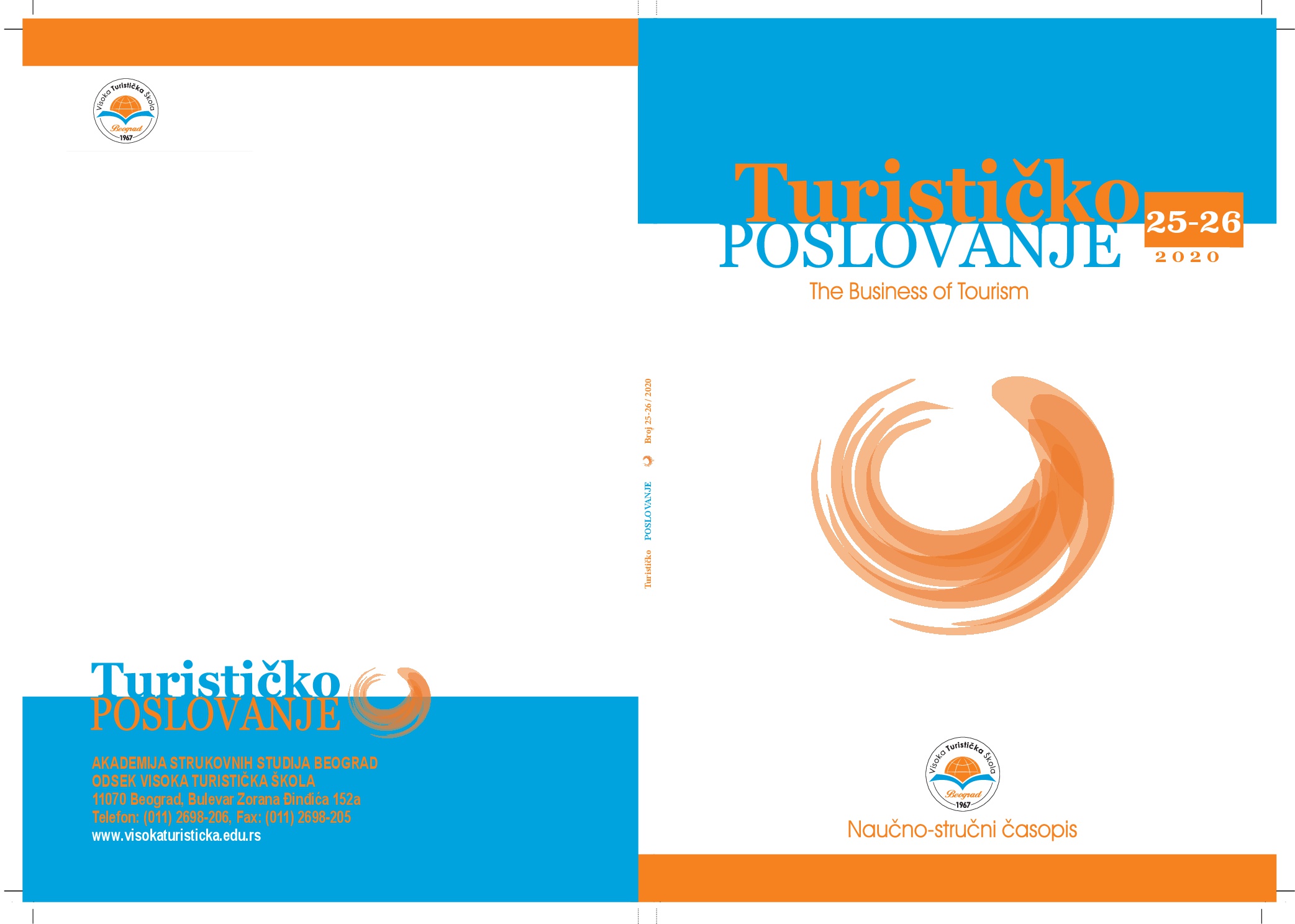SATISFACTION WITH WORKING CONDITIONS OF EMPLOYEES IN RESTAURANTS IN NOVI SAD
Abstract
Employee satisfaction is one of the key conditions for the success of a company. In order for an organization to succeed in business, it must know its employees and align their individual goals with organizational goals. Catering, as an expanding activity, is characterized by a large turnover of employees, which makes finding and retaining quality staff a very serious task for the organization. In order to increase their chances and keep competent staff, organizations must take care of the satisfaction of their employees. The aim of this research is to determine the degree to which restaurants in Novi Sad care about the satisfaction of their employees and whether the type of restaurant determines the degree of their satisfaction.
References
Bowling, N.A. (2007) Is the Job Satisfaction-Job Performance Relationship Spurious: A Meta-Analytic Examination. Journal of Vocational Behavior, 71 (2), 167–185.
Chaturvedi, V. (2005) A study on factors affecting job satisfaction of employees in the hotel industry: A study with reference to few categorized hotels in NCR. Summer Internship Society Management Prudence Journal.
Chiang, C. (2010) Perceived organizational change in the hotel industry: An implication of change scheme. International Journal of Hospitality Management, 29, 157–167
Cohen, A.; Golan, R. (2007) Predicting absenteeism and turnover intentions by past absenteeism and work attitudes. Career Development International, 12 (5). 416–432.
Cooper, C. L., Locke, E. A. (2000) Industrial and Organizational Psychology, Blackwell Business Ltd.
Cullen, N.C. (2001) Team Power, managing human resources in the hospitality industry, Prentice Hall Inc. New Jersey.
Goldberg, C. B., Waldman, D. A. (2000) Modeling employee absenteeism: Testing alternative measures and mediated effects based on job satisfaction. Journal of Organizational Behavior, 21(6), 665-676.
Hoynala, V. M. (2009) Receptionists’ job satisfaction in hotels of Rovaniemi – Effects of unhappy and problematic customers, Jyvaskyla University of applied science, school of tourism and services management, Jyvaskyla.
Judge, T. A., Thorensen, C.J., Bono, J. E., Patton, G. K. (2001) The job satisfaction job performance relationship: A qualitative and quantitative review. Psychological Bulletin, 127(3), 376-407.
Judge, Т. Heller, D., Mount, M. (2002) Five-factor model of personality and job satisfaction: A meta-analysis. Journal of Applied Psychology, 87(3), 530-541.
Krishnan, S.K., Singh, M. (2010) Outcomes of intention to quit of Indian IT professionals. Human Resource Management, 49 (3): 419–435.
Laškarin Ažić, М. (2017) The impact of hotel employee satisfaction on hospitality performance. Tourism and Hospitality Management, 23/1, 105-117.
Moorman, R.H. (1993) The influence of cognitive and affective based job satisfaction measures on the relationship between satisfaction and organizational citizenship behavior. Human Relations, 46 (6), 759–776.
Özer, G., Günlük, M. (2010) The effects of discrimination perception and job satisfaction on Turkish public accountants’ turnover intention, African Journal of Business Management, 4(8), 1500–1509.
Pelit Е., Öztürk Y., Arslantürk Y. (2011) The effects of employee empowerment on employee job satisfaction: A study on hotels in Turkey. International Journal of Contemporary Hospitality Management, 23/6, 784 – 802.
Sánchez S., Santa Cruz, F., López-Guzmán, T. (2013) Analysis of Job Satisfaction in the Hotel Industry: A Study of Hotels in Spain. Journal of Human Resources in Hospitality & Tourism, 13, 63-80.
Spector, P. E. (2008) Industrial and Organizational Behavior. Oxford, England: Wiley.
Suriyankietkaew S., Avery G. (2014) Employee satisfaction and sustainable leadership practices in Thai SMEs. Journal of Global Responsibility, 5/1, 160 – 173.
Thompson, E.R., Phua F.T.T. (2012) A Brief Index of Affective Job Satisfaction. Group & Organization Management, 37 (3), 275–307.
Tomažević, N., Seljak, J., Aristovnik, A. (2014) Factors Influencing Employee Satisfaction in the Police Service: The Case of Slovenia. Personnel Review, 43 (2), 209–227.
Tsai, M. C., Cheng, C. C., Chang Y. Y. (2010) Drivers of hospitality industry employees’ job satisfaction, organiyational commitment and job performance, African Journal of Business Management, 4(18), 4118–4134.
Wright, Th. A. (2006) The emergence of job satisfaction in organizational behavior, A historical overview of the dawn of job attitude research. Journal of Management History, 12, 262-277.
Yang, J.T. (2010) Antecedents and consequences of job satisfaction in the hotel industry, International Journal of Hospitality Management, 29, 609-619.
Бешлић И., Бешлић Д. (2008) Задовољство послом. Висока пословна школа струковних студија. Нови Сад. Школа бизниса, 154-161.
Гагић, С., Калењук, Б., Јовичић, А., Петровић, М. Д. (2016) Друштвено одговорно пословање у угоститељству. Туристичко пословање, 18, 33-41.
Галичић, В., Лашкарин, М. (2016) Принципи и пракса туризма и хотелијерства. Факултет за менаџмент у туризму и угоститељству, Опатија.
Перић, Г., Гашић, М., Ивановић, В., Стојиљковић, М. (2015) Задовољство запослених у бањским туристичким дестинацијама Србије, Часопис БизИнфо, 6 (2), 1–15
Танасијевић, З. (2006) Задовољство запослених. Асоцијација за квалитет и стандардизацију Србије, Крагујевац
Танасијевић, З. (2007) Задовољство запослених – извор или резултат мотивације запослених. Асоцијација за квалитет и стандардизацију Србије, Крагујевац.
Чизмић, С., Вишацки, Т. (2009) Повезаност индивидуалних вредности и организационекултуре као предиктор задовољства послом у војној средини. Војно дело, 3, 217-233.

